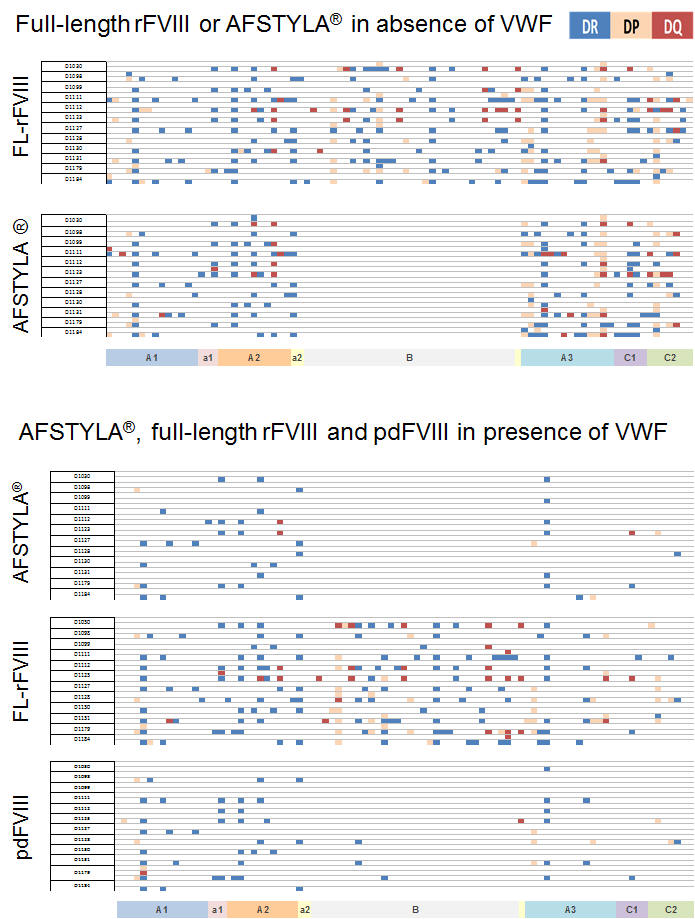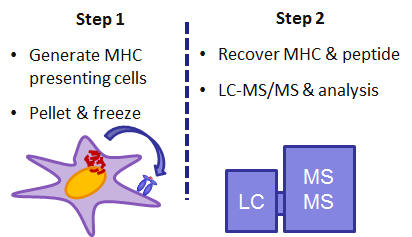ProPresent® Antigen Presentation (MAPPS) Assay
the world's most versatile MHC-associated
peptide proteomics (MAPPS) assay service
ProPresent® is ProImmune's MHC-associated peptide proteomics (MAPPS) assay. It lets you directly identify the peptides which are presented by antigen-presenting cells to T cells. Our core assay has a turnaround time of just 3-4 weeks.
Key new publication for ProPresent®:
Team at FDA and CSL Behring investigate the presentation of FVIII-derived peptides in monocyte-derived DCs derived from hemophilia patients as well as healthy donors
Watch the FDA's Zuben Sauna present data related to this study at Mastering Immunity 2018:

Wojciech Jankowski et al., Peptides identified on monocyte-derived dendritic cells: a marker for clinical immunogenicity to FVIII products Blood Advances 2019 3:1429
Figure 1: ProPresent® example workflow when measuring presentation from protein or protein mixture. Antigen-presenting cells take up the protein and process/present peptide fragments bound in MHC molecules on the cell surface. Cells are lyzed and HLA-peptide molecules recovered in an immune affinity step. Peptides are recovered from the HLA molecules and analyzed by LC-MS/MS. Identified sequences are subjected to rigorous analysis to identify true positive peptides with high confidence. |
Background to ProPresent®
ProPresent® tells you exactly which epitopes from your biotherapeutic drug or other protein of interest are presented by HLA molecules to T cells. Peptides are identified by the classical method of HLA-peptide complex extraction, peptide elution and subsequent peptide epitope identification by sequencing mass spectrometry.
ProPresent® can be used to identify the peptides associated with HLA-DR, DP or DQ, and with HLA Class I. Combined with ProImmune’s REVEAL® HLA-peptide binding assays and functional T cell assays, ProPresent completes the picture in understanding the potential immunogenicity of your compounds.
Request a Quote
Key publication by team at CSL Behring investigating reduced immunogenicity of sc-rFVIII AFSTYLA®
M. Hofmann, et al. (2017) "Analysis of the Novel Recombinant Factor VIII-SingleChain Protein Predicts A Lower Immunogenic Potential as Compared to Full-length Recombinant FVII"
(read the full abstract here)

Figure 2: ProPresent® assay to investigate modulation of antigen presentation of FVIII by VWF. FL-rFVIII expressed more unique epitopes than AFSTYLA® in the absence of pdVWF due to B domain truncation. Complexing with VWF (in a physiologic relevant ratio) dramatically reduced the generation of T cell epitopes for AFSTYLA® to that observed with pdFVIII in presence of VWF. In contrast, T cell epitopes generated from FL-rFVIII were poorly inhibited by VWF *. Five (magenta boxes, top lower panel) out of 43 uniquely or more frequently presented FL-rFVIII-derived epitopes (identified in presence / absence of VWF) triggered T cell proliferation in a ProMap® study**. A previous ProPresent®/ ProMap® identified 27 FL-rFVIII-B domain derived and one T cell epitope common for FL-rFVIII and BDD-rFVIII, not present in AFSTYLA® (data not shown).
*Healthy donors (n=12) were selected as source of moDCs with HLA-DR/DP/DQ covering ~80% of global population. One row of each data set shows HLA-DR/DP/DQ presented T Cell epitopes from donor 1-12 plotted against FVIII sequence with allele specific color-code
** Healthy donors (n=40), <98% population coverage, n=57 synthetic overlapping peptides tested
Short summary: AFSTYLA® developed by CSL Behring is the first and only single chain recombinant FVIII molecule designed to increase dosing intervals while providing high clinical efficacy. CSL Behring used ProImmune's ProPresent® antigen presentation assay to investigate AFSTYLA® for antigen presentation by dendritic cells via HLA DR, DQ and DP. It was found that antigen presentation for AFSTYLA® is reduced compared to other commercial rFVIII products. Follow-on ProImmune ProMap® T cell assays also showed a reduced T cell epitope response profile for AFSTYLA®. Overall the findings from such pre-clinical assays are consistent with clinical results for AFSTYLA® that are already available, where no inhibitors to AFSTYLA® were found (read the full abstract here)
ProPresent® example applications
Determine protein antigenicity
Identify which antigens from an oncogene, virus, bacteria, pathogen, vaccine or other vector are actually presented on cells
Discovery of new biomarkers
Discover new peptide targets for cancer and infectious disease interventions
Understand the impact of protein modifications on immune responses
Separate analysis for HLA-DR, DP, DQ, pan HLA-ABC, HLA-A2, mouse H-2 available
Example cell sources Tumor tissue Cell lines Healthy donor cells Cell samples from treated patients Cultured cells, e.g. DCs, B cells and other cells
| Antigen source DNA / RNA Exosomes Viruses VLPs Bacteria Lysates Purified proteins Protein mixtures
|
Detection options Mutated sequences (either from known mutation databases or established from exome sequencing) Peptide modifications, including phosphorylation, chemical modifications, so long as they are well defined
| Flexible, separable 2 step process Step 1 (carried out by Client or at ProImmune): Generated cells presenting MHC-peptide molecules, then pellet and freeze cells. Step 2 (carried out at ProImmune): cell lysis and recovery of peptide from MHC followed by LC-MS/MS sequencing of peptides
|
 |
Figure 3: ProPresent® simplified workflow. Since ProPresent® involves two separate steps, (1) to provide antigen presenting cells with MHC-peptide complexes on the cell surface and (2) processing cells and analysing MHC-bound peptides, the assay can work in any scenario where MHC can be recovered from the cell surface, whether cells are provided by the Customer or ProImmune. |
ProPresent® and immunogenicity
Knowledge gained from ProPresent® and ProImmune’s REVEAL® Immunogenicity services provides you with the information needed to understand and manage immunogenicity of biotherapeutics or other protein compounds. Our system permits comparison of data from a set of donor samples and can help explain whether patients with particular HLA-types could be at higher or lower risk of an adverse reaction to a biological compound. The assay is compatible with fully formulated biologics and can also be used to compare different proteins, or different formulations of the same protein for an alteration in the pattern of presented epitopes. ProImmune’s whole protein DC-T cell and peptide T cell proliferation assays can be employed to confirm functional relevance of the epitopes identified by ProPresent®.
Applications for the ProPresent® Antigen Presentation Assay
Epitope discovery and characterization
- Epitope discovery and characterization
- Establish epitopes for monitoring a patient response to a vaccine or biologic
- Profile known or suspected allergens
- Identify the immunological impact of sequence variants of the same protein, e.g. in viral proteins, or for tumorigenic point mutations
- Investigate the population bias of epitope responses using HLA-typed donors
Risk Assessment of Biologics
- Identify presented epitopes in food additives or other consumer goods, e.g. cosmetics
- Identify presented epitopes in pharmaceuticals and other biological products
- Compare and contrast the presented epitopes from different batches, formulations, or production methods for the same biologic, to pre-empt safety concerns
Profile the responses to biosimilars and biobetters
Establish a baseline for safety assessment; compare novel agents to established, safe, comparator proteins
Generate data to support a regulatory submission
Detailed Process Flow for ProPresent® Antigen Presentation Assay Service where ProImmune Provides Dendritic Cells
Protein is supplied by the customer
A panel of HLA-typed, healthy donor peripheral blood mononuclear cell (PBMC) samples are prepared from the ProImmune tissue bank (selected to reflect HLA distribution of choice)
Monocytes from donor PBMC are cultured in defined media and differentiated to produce dendritic cells (DC)
DC are loaded with the test antigen and induced to mature
DC are harvested, HLA molecules are purified and the associated peptides are eluted
Peptide samples are analyzed by sequencing mass spectrometry
The mass spectrometry data is compared against a protein database library consisting of the sequence of interest and the Swiss-Prot database of the organism of choice
Peptides are ranked by significance according to a probability based algorithm
Data are verified by searching against a scrambled decoy database to reduce false positives
A full data report is compiled, listing all detected epitopes including presentation of nested epitope sets and anchor analysis against characterized HLA alleles with a summary of detected control proteins.
Delivery time can be approximately 6 weeks, depending on the scope of the project
Key publications for ProPresent ® :
Team at Danone investigates tolerogenic potential of innovative infant formula:
Gouw J.W., Jo J., et al. Identification of peptides with tolerogenic potential in a hydrolysed whey-based infant formula Clin. Exp. Allergy (2018) 1-9 DOI: 10.1111/cea.13223
Team at Novo Nordisk and FDA investigate the immunogenicity of engineered F-VIIa
Kasper Lamberth, Stine Louise Reedtz-Runge, Jonathan Simon, Ksenia Klementyeva, Gouri Shankar Pandey, Søren Berg Padkjær, Véronique Pascal, Ileana R. León, Charlotte Nini Gudme, Søren Buus and Zuben E. Sauna
Post hoc assessment of the immunogenicity of bioengineered factor VIIa demonstrates the use of preclinical tools
Science Transl. Med. 2017 9:372
AAPS Meeting report published by authors from Amgen, Novartis, Genentech and ProImmune:
M. Benjamin Hock, Karen E. Thudium, Monserrat-Carasco-Tiguero and Nikolai F. Schwabe (2015)
Immunogenicity of Antibody Drug Conjugates: Bioanalytical Mehtods and Monitoring Strategy for a Novel Therapeutic Modality
The AAPS Journal, Vol. 17, No 1, January 2015, 35-43
Read full text here
Team at Pfizer explores antigen presentation for therapeutic monoclonal antibodies
Xue, L.1, Hickling, T.1, Song, R.2, Nowak, J.3, & Rup, B.1 (2015) Contribution of enhanced engagement of antigen presentation machinery to the clinical immunogenicity of a human IL-21 receptor‐blocking therapeutic antibody. Clinical Experimental Immunology; (Accepted Article); 24 September 2015